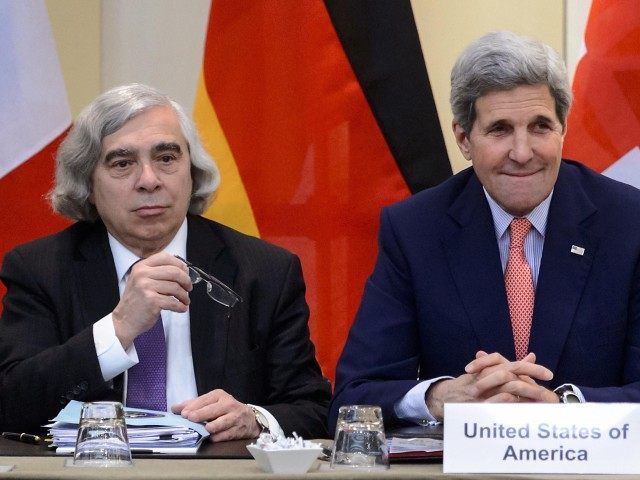If the Iran deal were any good, the Obama administration would not have to lie about it. Yet Secretary of State John Kerry and Secretary of Energy Ernest Moniz continue to do just that. The latest example is a joint op-ed in the Washington Post, in which the Laurel and Hardy of American diplomacy attempt to defend the nuclear deal using a series of half-truths and blatant lies that is worth decoding concisely, in full.
Claim: Obama fixed the mess Bush left. It is telling that Kerry and Moniz begin by blaming Bush. Here are the facts about what really happened when Obama took office. Bush left his successor a rare diplomatic achievement: a series of UN Security Council resolutions that united the international community against Iran’s nuclear program. Obama set about trying to unravel that consensus. He opposed new sanctions and allowed the regime to regroup during the Green Revolution–an event Kerry and Moniz omit. Yes, Iran was racing down the nuclear path–and Obama was content to let it do so, until Congress and the French–the French!–pressured Obama to acknowledge reality.
Claim: The Iran deal is the “best” and “only” way to prevent Iran from obtaining a nuclear weapon. By President Obama’s own admission in April, the deal allows Iran to achieve “zero” breakout time toward a nuclear weapon after ten years or so. Many better deals were possible, including deals that address Iran’s support for terror. But Obama gave up on those options–and on military pressure.
Claim: The deal blocks “each of Iran’s possible pathways” to a nuclear bomb. It blocks certain pathways–“the highly enriched uranium and the plutonium production pathways”–but only for now. It does not block “the covert pathway,” because the deal does not tell us about nuclear sites that Iran may have concealed, does not force Iran to account completely for its past cheating, does not provide the kind of access to military sites needed to monitor Iranian compliance, and–again–allows Iran to ramp up its program after several years.
Claim: Inspectors will have access to suspicious sites in 24 days–which is plenty. 24 days are a minimum, not a maximum. It is possible that Iran could hold out against international inspectors for far longer than that–perhaps months. Trace nuclear isotopes would still probably be detectable through environmental sampling at larger sites, though not at the smaller sites where Iran is likeliest to cheat. And not every form of cheating will involve radioactive material–some may involve conventional materials used in illegal centrifuges tests.
Claim: “The plan approved in Vienna does not expire — it is indefinite.” This is the most egregious lie of all. The “indefinite” provisions refer to the Additional Protocol to the Non-Proliferation Treaty, which the Iran deal says the Iranian parliament still has to approve. It gives no deadline for that approval–unlike the interim agreement, which set the deadline at one year. And in any case, Iran’s compliance with the Additional Protocol is voluntary. So the plan is “indefinite” only in the sense that it is indefinitely weak and inadequate.
Claim: The U.S. “fought hard” to keep the ballistic missile and arms embargoes. There is no ballistic missile embargo. The Iran deal replaces a mandatory ban on ballistic missiles with a voluntary one, and Iran says the embargo does not apply anyway, because none of its missiles are fitted for nuclear weapons. The fact is that the ballistic missile and arms embargoes were last-minute demands by Iran that the U.S. failed to resist because of Obama’s eagerness to sign a deal. They will allow Iran to continue its nefarious regional reign of terror.
Claim: The Iran deal takes nuclear weapons “off the table” and allows us to tackle other regional problems. False–the Iran deal leaves nuclear weapons very much on the table. It has already triggered interest among other regional powers in acquiring nuclear weapons. And it removes whatever leverage the U.S. once had to deal with Iran’s terrorism, its human rights abuses, its detention of four American captives, and its threats to Israel and other allies. It also makes solving the Israeli-Palestinian conflict virtually impossible, because Iranian-backed Palestinian terror groups will receive more weapons, eroding what is left of Palestinian will to compromise.

COMMENTS
Please let us know if you're having issues with commenting.